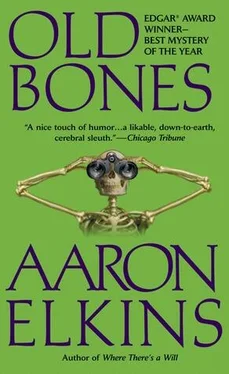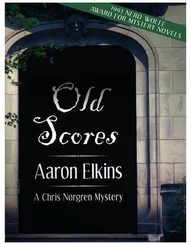Aaron Elkins - Old Bones
Здесь есть возможность читать онлайн «Aaron Elkins - Old Bones» весь текст электронной книги совершенно бесплатно (целиком полную версию без сокращений). В некоторых случаях можно слушать аудио, скачать через торрент в формате fb2 и присутствует краткое содержание. Жанр: Классический детектив, на английском языке. Описание произведения, (предисловие) а так же отзывы посетителей доступны на портале библиотеки ЛибКат.
- Название:Old Bones
- Автор:
- Жанр:
- Год:неизвестен
- ISBN:нет данных
- Рейтинг книги:3 / 5. Голосов: 1
-
Избранное:Добавить в избранное
- Отзывы:
-
Ваша оценка:
- 60
- 1
- 2
- 3
- 4
- 5
Old Bones: краткое содержание, описание и аннотация
Предлагаем к чтению аннотацию, описание, краткое содержание или предисловие (зависит от того, что написал сам автор книги «Old Bones»). Если вы не нашли необходимую информацию о книге — напишите в комментариях, мы постараемся отыскать её.
Old Bones — читать онлайн бесплатно полную книгу (весь текст) целиком
Ниже представлен текст книги, разбитый по страницам. Система сохранения места последней прочитанной страницы, позволяет с удобством читать онлайн бесплатно книгу «Old Bones», без необходимости каждый раз заново искать на чём Вы остановились. Поставьте закладку, и сможете в любой момент перейти на страницу, на которой закончили чтение.
Интервал:
Закладка:
The groups also agreed on height; not surprising since all the long bones were there, and the application of the Trotter and Gleser equations was an easy task. But the estimate was surprisingly low: five-feet-four, plus or minus two inches. His own quick and dirty estimate from the vertebrae had been five-eight, and he couldn’t possibly have been four inches off. Two, maybe. Besides, Joly had already told him his findings matched Alain’s description. The attendees had fouled up somehow. He’d go over their work with them in a few minutes and straighten them out. Odd that all three groups should get it so wrong.
The reports on race were next. Given the complexity- some anthropologists said the impossibility-of determining ancestry from the skeleton, he hadn’t been going to ask it of them. But they had wanted to try, using the few simplified guidelines he’d given them (and, he was sure, the various stereotypes about skull thickness, brain-cavity-size, and "primitive" features that many of them had brought with them). Gideon let them go ahead, confident the experience would be instructive if nothing else.
It was. Two of the groups couldn’t agree among themselves and gave up trying, their preconceptions in tatters. This Gideon thought of as salutary and not unexpected. But the final group’s report was a dandy.
"We have determined," said the grave, slow-spoken female CID inspector who presented their report, "that the remains are those of a person of the Mongoloid race."
"Mongoloid?" echoed Gideon.
"Mongoloid," he was assured. "Quite probably northeastern Asiatic."
Anyone but the solid, relentlessly sober Inspector Hawkins and he might have thought his leg was being pulled. "Now where the hell did you get Mongoloid from?" he asked.
Inspector Hawkins was unfazed. "We applied intermembral ratio analysis and got a tibial-femoral index of 81.4," she replied without tripping over a syllable.
Well, she had her theory right, if nothing else. A tibial-femoral index of 81.4 meant that the tibia-the shin bone-was 81.4 percent as long as the thigh bone. And anything less than 83 percent was generally accepted as Mongoloid, reflecting the shortness of the Asiatic lower leg compared to the upper leg. In other races the typical ratio was much higher.
"Did you take the physiological lengths of the bones, not the maximum lengths?" he asked.
For the first time the sturdy Inspector Hawkins faltered. "The…ah…physiological lengths?"
That explained it, he thought with some relief. For a moment there he’d started to wonder what was going on. As racial criteria went, intermembral ratios weren’t bad, but they required trickier measurements than he’d been able to present in class. He’d spent a few minutes talking about the principles involved, but he hadn’t expected anyone to try and apply them. Fine, it would be one more good lesson for them to take back: using half-understood techniques was a mistake that could result in ludicrous errors. Better to call in an expert when you weren’t sure what you were doing.
"Here, let me show you how it’s done," he said, and taking the sliding calipers he moved to the table and picked up the right tibia. "Now, the physiological length of a long bone is its functional length, which you…"
His voice faded as he became aware of the odd heft of the bone. Puzzled, he looked more closely at it. Then quickly at the other tibia, and then both femurs. It was the first time he’d really examined them, and after twenty or thirty seconds’ study, he was still puzzled.
For one thing, Inspector Hawkins was right, even if she’d gone about it wrong. He didn’t need the calipers to tell him that the tibia was quite short compared to the femur. But it was the lightness of these normally dense leg bones that bothered him; that and their shape. There was something odd about them; not wildly odd, but
…something.
"Strange…" he said, more to himself than anyone else, and ran his fingers down the dusty, dry, brown length of a femur.
The class had seen him at work before and they were used to this. They waited patiently.
Not Joly. He stepped up to the table. "What’s strange?"
"The bowing," Gideon said abstractedly, continuing to move his hand over the bone. "Look at the shaft. And do you see the torsion in both tibias-just a little, as if someone grabbed each end and gave it a small twist?"
"No," Joly said.
"Do you know what that means?" Gideon went on, still staring at the bones.
"No," Joly said again, this time with a wary edge to his voice.
"Oh-oh," John murmured from outside the jellyfish-ring. "Looks like another case of cleidocranial whatsamatosis."
The circle of trainees surged silently forward with interest, all at the same time, like a jellyfish flexing inward.
Gideon looked at Joly. "Inspector, I know who this is."
Joly looked down his nose at him, head tilted back, lips pursed, eyes narrowed. "You knew who it was yesterday."
"I was wrong," Gideon said.
SEVENTEEN
There was a ripple of anticipation around the circle. They had been through three sessions with Gideon, and they knew that he was not above the occasional use of a dramatic device to make a point. But this time they waited in vain.
"I think," Joly said, "this is something the professor and I had best talk about alone. I’m sure you understand."
"Good idea," Gideon agreed. What he had to say was going to test Joly’s newly acquired tolerance to its limit, and it would never do for the dignified inspecteur principal to have a fit in front of his colleagues.
When they had left, buzzing, Joly closed the door behind them, silently walked the length of the room back to the table, looked at John, looked at Gideon, and sighed.
"I know I’m going to regret this…" He tipped his head towards the table, looked back at Gideon, and elaborately formed his lips into a circle, as if he were about to blow a smoke ring.
"Who?" he said suspiciously.
Gideon decided that the best way to tell him was just to tell him.
"I think it’s Guillaume du Rocher."
After a brief moment of stunned silence, John smacked his big hands together and yelped with joy.
Joly’s lips continued to form their fishlike O for a few seconds, then wavered and shut. He subsided slowly into one of the scattered chairs with another immense sigh.
"This-" Gideon began.
But Joly was resignedly holding uphis hand. "By Guillaume du Rocher," he said patiently, "I imagine you mean… I pray fervently you mean… some long-lost relative-of whose existence only you happen to be aware, of course- who happens to have the same name as the Guillaume du Rocher who drowned last Monday in Mont St. Michel Bay?"
"No, I don’t-"
"Because you can not mean the Guillaume du Rocher who drowned last Monday in Mont St. Michel Bay, and who was publicly buried in the family cemetery at Rochebonne one day before the first of these bones-these very old bones-were found." A rare plaintive look puckered the flesh around his eyes. "Can you?"
"No, I don’t mean that Guillaume either."
"Come on, Doc," John laughed. He too dropped into one of the black plastic-and-chrome chairs. "What do you mean? Who is this guy?"
"What I mean," Gideon said, "is that unless I’m way off base the man who drowned in the bay wasn’t really Guillaume du Rocher."
Their expressions were so artlessly baffled-jaws dropping, brows soaring, like a couple of ungifted actors simulating astonishment-that he burst out laughing. In all fairness, he remarked to himself, being the Skeleton Detective of America did have its moments.
"I’m pretty sure this is the real Guillaume," he said with a glance at the skeleton, "and he’s been dead since World War II, not since last Monday."
Читать дальшеИнтервал:
Закладка:
Похожие книги на «Old Bones»
Представляем Вашему вниманию похожие книги на «Old Bones» списком для выбора. Мы отобрали схожую по названию и смыслу литературу в надежде предоставить читателям больше вариантов отыскать новые, интересные, ещё непрочитанные произведения.
Обсуждение, отзывы о книге «Old Bones» и просто собственные мнения читателей. Оставьте ваши комментарии, напишите, что Вы думаете о произведении, его смысле или главных героях. Укажите что конкретно понравилось, а что нет, и почему Вы так считаете.












